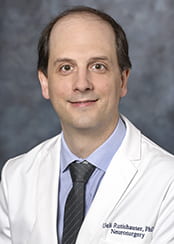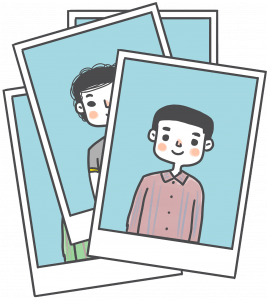“I am acutely aware of the tremendous importance of memory in defining who each of us are and how devastating it is to lose this ability, increasing my drive to find ways to improve memory.”
 An interview with Ueli Rutishauser, PhD
An interview with Ueli Rutishauser, PhD
Board of Governors Chair in Neurosciences; Director, Human Neurophysiology Research; Professor of Neurosurgery; Neurology; Biomedical Sciences; Cedars-Sinai Medical Center
2/29/20
Have science and research always been on your mind or did you think you’d pursue something else when you were young?
My first fascination was computers: I was endlessly fascinated by how to make a machine do something by programming it. So, I spent all my time programming (starting with Turbo Pascal!). I was set on going into software engineering, and majored in computer science as an undergraduate. As I was pursuing my CS coursework I started to learn about approaches to solving problems with computers that were motivated by biology, such as automata, fuzzy logic, neural networks, and reinforcement learning. I wondered how this knowledge was obtained, and so started to learn about neuroscience. As part of exploring the world of neuroscience, I got to know one of my most influential mentors: Rodney Douglas at ETH in Zurich, Switzerland (where I grew up). He is a theoretical neuroscientist who advised me on my undergraduate thesis. He opened my eyes to the world of science by showing me that some of the most fundamental problems in our understanding of the brain are at the intersection of understanding of what it means to compute and neurobiology. I was hooked! It was this experience that led me to pursue graduate school and a career in science.
What questions are most exciting to you in your work right now?
 I am fascinated by our ability to learn quickly. For example, if I show you a photograph of someone for one second, it is quite likely that you can recall this image for the rest of your life. So, something permanently changed in your brain by this single brief exposure. A long-term goal of mine is to understanding the neural mechanisms by which such ‘one-shot’ learning can occur. A question I find particularly fascinating presently is whether such rapid learning relies on rules of plasticity other than spike timing dependent plasticity.
I am fascinated by our ability to learn quickly. For example, if I show you a photograph of someone for one second, it is quite likely that you can recall this image for the rest of your life. So, something permanently changed in your brain by this single brief exposure. A long-term goal of mine is to understanding the neural mechanisms by which such ‘one-shot’ learning can occur. A question I find particularly fascinating presently is whether such rapid learning relies on rules of plasticity other than spike timing dependent plasticity.
Has studying memory influenced how you think about memory in your own life?
Considerably, yes. I am more aware about how memories of my own experiences shape my life, about the circumstances that make a memory ‘stick’ vs. make it not leave a trace at all. Also, I am acutely aware of the tremendous importance of memory in defining who each of us are and how devastating it is to lose this ability, increasing my drive to find ways to improve memory.
What’s the best piece of advice you’ve ever received?
An important piece of advice that I have received is that it matters more who you work with rather than exactly what you work on. This is very true for me and believe is also applies more generally to collaborators – I find it much more important to have great mentors and colleagues than to work in exactly what I had in mind. The particular problem one ends up working on will come naturally from having found a mentor who one truly gets along with on a personal level.
To learn more about Dr. Rutishauser and his work, click here.
Click here to go back to the “Interviews with Scientists” page.
